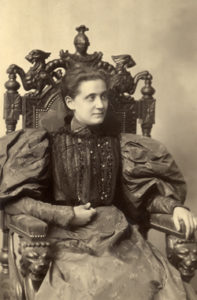
Jane Addams
Jane Addams was born in 1860 Cedarville, Illinois, US, the eighth of nine children. Her father was a prosperous miller and local political leader. He fought in the Civil War and was a friend of Abraham Lincoln.
After a visit to London, Jane was inspired to open a house (called Hull House) in an underprivileged area of Chicago as “a center for a higher civic and social life; to institute and maintain educational and philanthropic enterprises and to investigate and improve the conditions in the industrial districts of Chicago.”
Jane made speeches about the needs of the neighborhood, raised money, convinced young women of well-to-do families to help, took care of children, nursed the sick, listened to outpourings from troubled people. By its second year of existence, Hull House was host to two thousand people every week. There were kindergarten classes in the morning, club meetings for older children in the afternoon, and for adults in the evening. It became virtually a night school for many underprivileged people. Soon Jane got involved in many civic responsibilities.
Jane also became a crusader for peace and spoke against America’s entry into the First World War. She became the president of the International Congress of Women convened at The Hague. When this congress later founded the organization called the Women’s International League for Peace and Freedom, Jane served as its honorary president for the remainder of her life.
Jane was also a feminist and suffragist. She stood for human rights and was a cofounder of the American Civil Liberties Union. She became known as the founder of the social work profession, a reformer, a pacifist, a radical pragmatist and the first woman “public philosopher” in the US.
Since she publicly opposed America’s entry into the war, Jane was attacked in the press and expelled from the Daughters of the American Revolution. But she became an assistant to Herbert Hoover in providing relief supplies of food to the women and children of the enemy nations.
After sustaining a heart attack in 1926, Jane never fully regained her health. Indeed, she was being admitted to a Baltimore hospital on the very day, December 10, 1931, that the Nobel Peace Prize was being awarded to her in Oslo. She died in 1935 three days after an operation revealed unsuspected cancer. The funeral service was held in the courtyard of Hull-House. When Jane died, she was the best-known female public figure in the US.
Jane Addams and the Women’s International League for Peace and Freedom were jointly awarded the Nobel Peace Prize in 1931 “for their assiduous effort to revive the ideal of peace and to rekindle the spirit of peace in their own nation and in the whole of mankind.”
